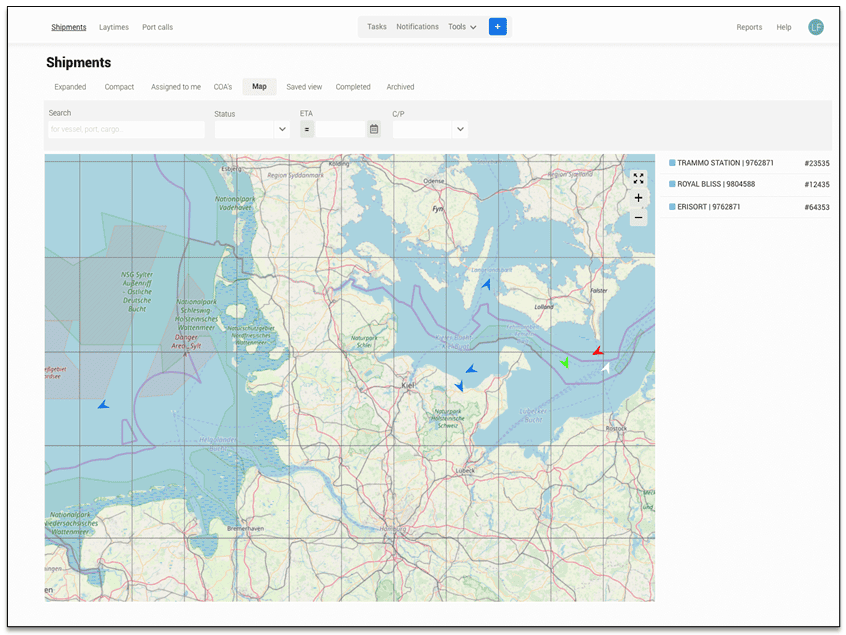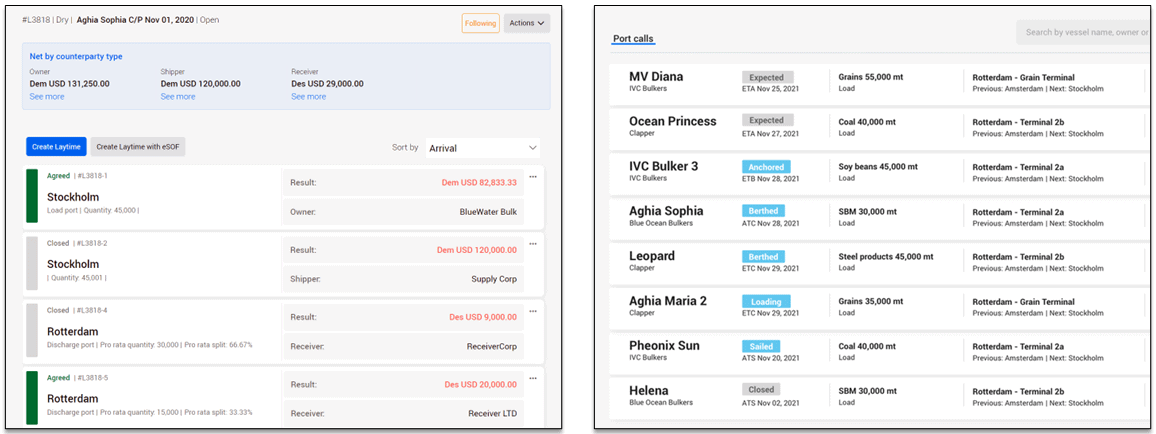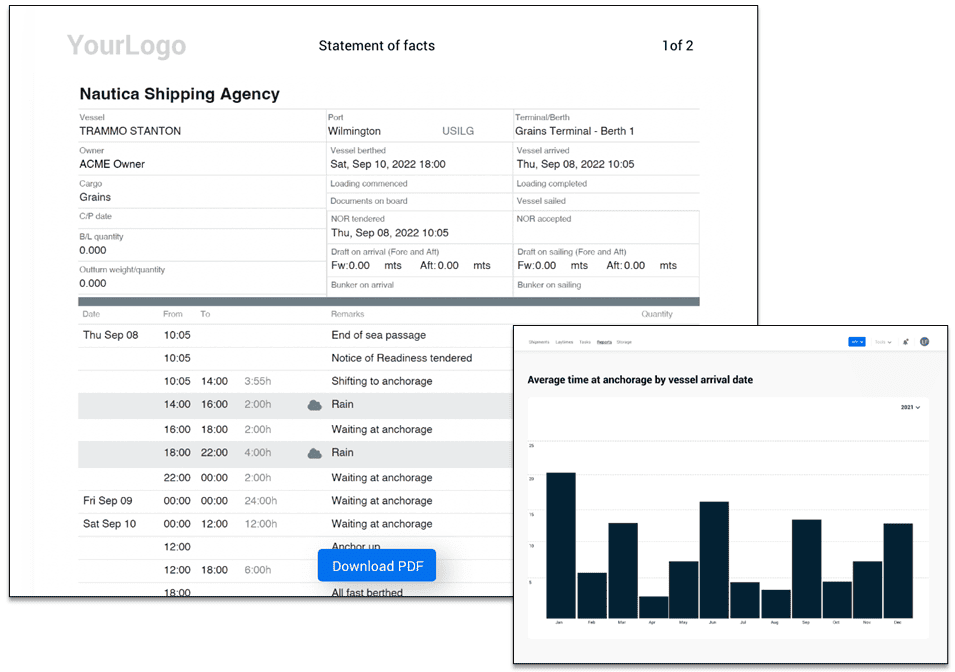Simplifying Bulk Freight Supply Chain Management
Many organizations in the maritime industry are held back by spreadsheets, cluttered emails, fragmented systems, and a lack of visibility into the shipping process. Without modern technology, the obstacles and fluctuations of the market are significantly more difficult to navigate.
Anders Carlsson and Frederik Tham, co-founders of the Stockholm-based startup Enqlare, have set out to bring modern technology into the world of maritime shipping. Their goal: to help their customers keep pace with the industry and improve efficiency by centralizing systems, like accounting and ERPs, and automating workflows that control planning, management, chartering, and production.
To harness their business expertise and rapidly bring these vital solutions to their customers, Enqlare decided to leverage the Mendix low-code development platform as the foundation for their own SaaS offerings. Today, Enqlare offers three core products for cargo owners and ship agents to better organize bulk freight businesses through automation.
Embracing Modern Technology
“It’s a very old-fashioned industry,” explained Carlsson of the maritime industry. Many shipping companies were quick to adopt early global communication technologies like fax machines and Telex, but eventually plateaued and are now slow to implement new software.
“Within these companies, we see that their systems are still spreadsheets, PDFs, or shared folders. You can get a PDF with maybe 400 lines of data then have to manually input it into a spreadsheet or legacy software,” Carlsson added. The word “enqlare” means simpler in Swedish, and that approach was key for Tham and Carlsson to successfully start a freight solution business and set themselves apart from competitors in the market.
Digitalization would be the key to unlocking new potential in the industry.
With a forward-thinking mentality, Enqlare developed its solutions to help charterers embrace modern communication tools and migrate to a scalable bulk freight platform.
Lowering the Barrier to Entry

Tham’s experience in IT brought a depth of knowledge on solution delivery to the young startup. Quick prototyping and experimentation with real use cases was a priority, and what they needed was a future-proof, reliable platform to materialize Enqlare’s vision.
“At a previous company, I had done a thorough assessment of low-code versus traditional methods. I investigated other platforms like .Net, Java, OutSystems, and off-the-shelf solutions,” Tham said. “But when I spoke to different companies in Europe who had built similar platforms, I found the best examples were based on Mendix. So, when we started in 2016, that was why we decided to go with the Mendix platform.”
Building a technology stack for a new venture in a complex industry can be difficult. But for Tham and Carlsson, having Mendix as a complete solution to ensure rapid development and future scalability was a game changer.
“In a way, we have just one supplier by using Mendix. I don’t have different distributors for infrastructure, database licenses, or anything else,” said Tham.
Another core requirement for Enqlare was fully-managed and robust platform security. “The certifications that come from Mendix provide a very solid foundation for us,” said Tham. “Most of our clients know about our SOC 2, but if you go to Europe, they’re probably more into ISO and Mendix having both is a huge benefit for us.”
Most PaaS or SaaS companies would need years of research and development before launching, but once Tham and Carlsson had their innovative idea, Mendix allowed them to bring their software to market rapidly. Leveraging the Mendix platform, a team of just two developers was able to start prototyping what would be the first solution, Enqlare Shipments, in 2017.
Transforming Antiquated Processes
The Enqlare platform offers a shared space for customers to manage daily tasks and collect insights to navigate the market.
The primary users of Enqlare’s solutions are buyers and sellers of commodities, traders, ship agents, owners and operators, ship brokers, and maritime service providers. These teams have greater visibility into the shipping supply chain and a new means for improving operational efficiency with Enqlare’s solutions, which are:
- Shipments, a chartering management system that offers real-time voyage updates, port activity, schedules, and data insights.
- Laytime, a cloud-based solution that allows users to track and compute all laytime calculations in one place.
- Port Calls, a port agency software with features such as information sharing and “smart documents.”
For Tham, the connectivity between all three products differentiates Enqlare from others in the industry.
“With Port Calls specifically, we’ve created what we call a connection, but it’s really data sharing between buyers of freight and what happens in their ports,” said Carlsson. “And that was entirely manual before with massive, huge messy PDFs and long emails that had to be retyped.”
Enqlare’s development team frequently collaborates with their customers to identify and prioritize new features and enhancements.
“We have regular calls with our customers to get feedback. There are some clients we work very closely with, especially when it comes to developing bigger features. For example, we’re setting up a standard accounting system integration. So, anyone will be able to integrate with any accounting system, but we are working with clients for the first implementation to make sure we get it right,” Tham said.

Improved Collaboration
Enqlare’s portfolio includes real-time communication tools to ensure that their customers’ “team and partners are all on the same page.”
Their Shipments solution offers a shared space to improve control and share data with stakeholders, featuring task management modules, schedules, reports, smart documents, and dashboards. Port Calls similarly connects and synchronizes data, further uniting stakeholders, partners, and clients alike to improve delivery. These features allow various team members to work quickly, easily access their peers’ work, and distribute tasks effectively.
At a higher level, managers can get a clearer view of their operations, have greater control over global teams, and improve documentation of all vessels and voyages.

Greater Accuracy and Cost Savings
Enqlare’s solutions enable their customers to save money and avoid costly mistakes that are often associated with the unpredictable industry.
Now, companies can work at a faster pace to improve accuracy and maintain high-quality service delivery. This capability lowers operational costs, improves port call handling, and optimizes data to avoid information gaps and better manage workflows.
Laytime and Port Calls leverage Enqlare’s eSOF streamline calculations, track savings, and prevent mistakes. For more accurate estimates, teams can also leverage laytime templates and historical data to understand port activity and account for future plans.
“Laytime calculation is where you calculate the fees for a vessel in port,” said Tham.
Clean and clear data is a powerful commodity in the maritime industry. Carlsson elucidates: “For companies in the world of commodities, a lot of them are looking to make smart trades. And accurate information is key for this. Knowing the queues in a certain port or how quickly they’re loading has huge commercial implications and can be the difference between a profitable trade and a loss. So, the more information the better.”

Data Sharing for Advanced Insights
Tham is especially proud of the advanced insights Shipments, Laytime, and Port Calls offer Enqlare’s customers.
“The same can be said for our insights creation feature,” Tham added.
Improved data hygiene and transparency also makes a strong impact on a shipping organization’s bottom line. “The industry has typically struggled to capture data and insights. It’s a big time-saver from a process perspective, but more importantly for internal operations because if you make a mistake or a typo, the repercussions can be quite expensive,” Tham explained.

“We have multiple reports from customers saying that our data sharing boosts efficiency. It frees up time for other important tasks. And they can run their operations with a smaller team. They can scale up without adding headcount,” Tham said.
Accelerating Customers’ Digitization Strategies
Today, Enqlare has established itself as an organization that helps customers “reduce risk and turn data into profits.” The flexibility of the platform means customers’ individual needs be met rapidly with cutting edge technology that helps streamline their processes and digitalize their operations.
But this is just the beginning for Enqlare, who have rapidly established themselves as a fresh voice in an otherwise traditional industry and are bringing greater insights to the table to achieve global scalability. “We added something like 35 or 40 new companies over the spring and hired two more developers, so we expect to keep the pace going forward,” Tham shared.
Looking ahead, Enqlare plans to enhance the secure and scalable foundation they’ve built with low-code. “We have some very clear goals on raising our product quite a few steps, adding a mobile app, for example,” explained Tham. These plans include leveraging AWS services, such as Textract, and experimenting with machine learning.
The goal of simplifying customers’ digitalization efforts ultimately remains at the forefront of Enqlare’s mission. By basing their business on Mendix, Tham and Carlsson created a forward-thinking business model of bringing value to customers in innovative ways with a small development team.
“We didn’t have to invent the wheel, but instead could build a much stronger connection between different systems,” said Tham.